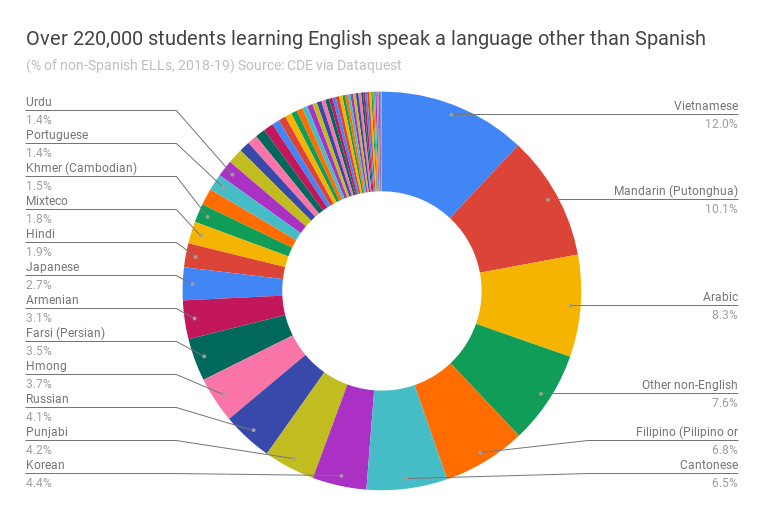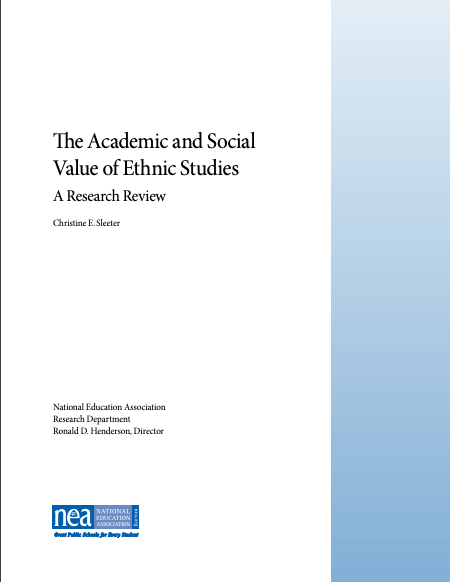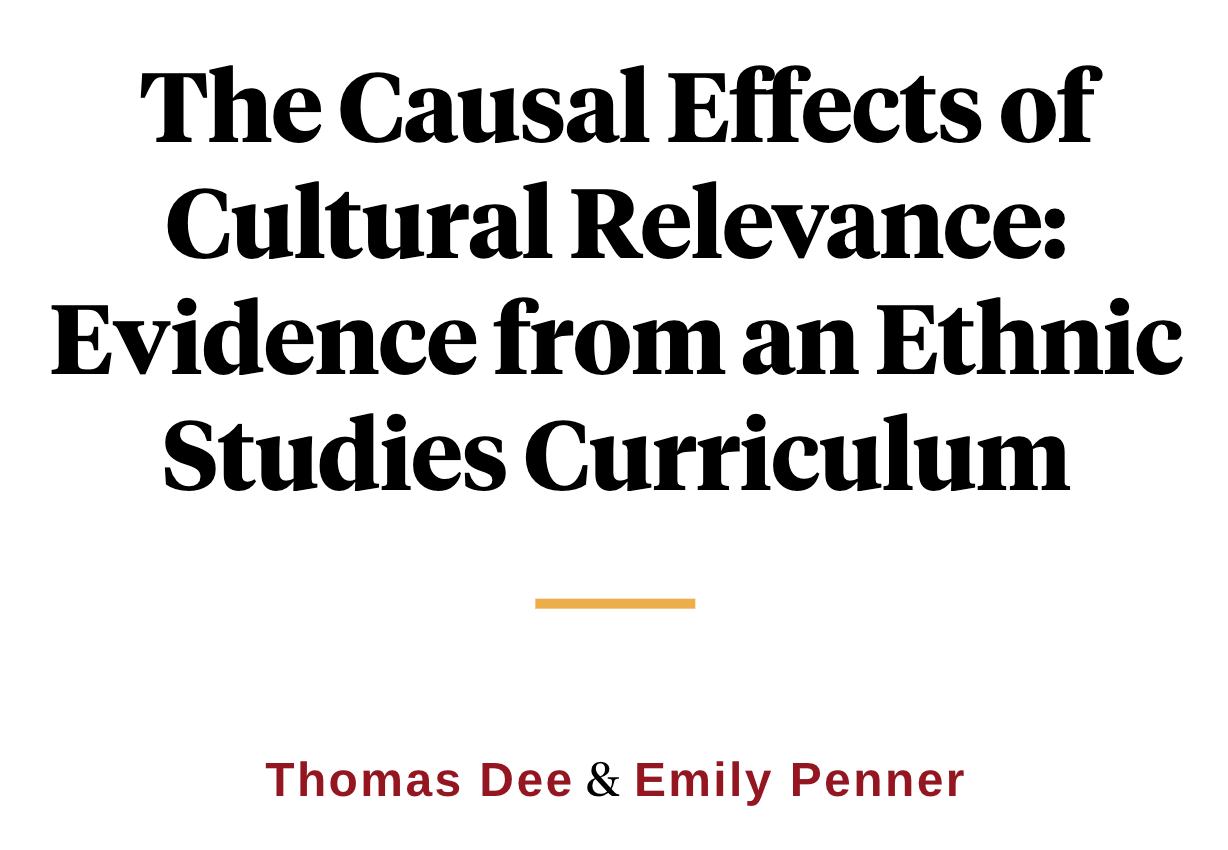Ethnic Studies: Why is it controversial?

This is the year
California’s upcoming legislative session [2021] looks like the year ethnic studies will become a statewide requirement for high school graduation.
Editor's note, March 2024: Carol's prediction was correct. Governor Newsom signed legislation in 2021 establishing that a semester course in ethnic studies would become a graduation requirement for all California students beginning with the class of 2029.
California has debated this graduation requirement for some time. It is already a graduation requirement for colleges in the CSU system. The path to requiring it for high school has been bumpy. While neither former Governor Brown nor Governor Newsom have opposed high school ethnic studies courses in principle, both vetoed legislation to make it mandatory.
Governor Brown opposed adding an additional graduation requirement:
“I am reluctant to encourage yet another graduation requirement, especially when students are already overburdened by multiple tests and endless hours of homework.”
— Jerry Brown
Governor Newsom also vetoed the requirement in 2020, but for a different reason: he felt that the model curriculum for ethnic studies was not yet ready for prime time. He asked for the proposal to be revised so that it “achieves balance, fairness, and is inclusive of all communities.”
“In California, we don't tolerate our diversity. We celebrate it. That should be reflected in our high school curriculum. I look forward to our model curriculum achieving these goals.”
— Gavin Newsom
What are Ethnic Studies?
Courses in ethnic studies are not a new idea. More than 50 years ago students led a historic strike at San Francisco State University to demand a more relevant curriculum. This resulted in the creation of the College of Ethnic studies. (As an aside, my own children are the beneficiaries of the ethnic studies movement in San Francisco. They were able to attend a Japanese bilingual bicultural elementary program that integrated language, history, literature and the arts.)
That’s really what the ethnic studies requirement is all about. It’s an interdisciplinary curriculum designed to engage diverse students. A course fulfilling this requirement might not be named “ethnic studies.” In 2018, the State Board of Education adopted general principles for an ethnic studies model curriculum that includes “engaging a range of disciplines beyond traditional history and social sciences, including visual and performing arts, English language arts, economics, biology, gender & sexuality studies, etc”
This topic is of particular importance in California, the most diverse state in the nation.

Unlike many other states, California’s History and Social Science curriculum Frameworks (adopted in 2016) already move away from the traditional Eurocentric approach to history and specifically recognize the importance of ethnic studies. Many California school districts already provide electives in ethnic studies. Some, such as Los Angeles, Oakland, and Fresno, have voted to require it to graduate from high school.
What Should An Ethnic Studies Course Look Like?
Glad you asked. One reason for the robust debate over an ethnic studies curriculum is that its scope and definition is in many cases in the eye of the beholder.
Should it be mainly targeted to support African American students because of historic racism? What about Asians and Native Americans who also were the targets of discrimination? Should Jews be included because of historic discrimination throughout the world including the United States? How about Arab Americans, Armenian Americans, Irish Americans and Sikh Americans?
The California Department of Education recommends four foundational disciplines of ethnic studies and has hosted a webinar series to focus on each of them.
|
Webinar Series about Ethnic Studies |
|---|
Debate over ethnic studies
Superintendent of Public Instruction Tony Thurmond has expressed a sense of urgency about adoption of the model curriculum. “Our students of color cannot wait additional years to see their stories represented in the classroom,” he said. “They have already waited generations.”
Adopting a new model curriculum requires lots of public testimony. When the first draft of the ethnic studies model curriculum was unveiled, it was clear that not everyone was on the same page. Contentious would be an understatement.
The number of public comments on the draft rivaled viral social media posts. There were thousands and thousands of comments and hours and hours of public testimony, especially from groups that felt left out or mistreated.
The California Legislative Jewish Caucus, for example, said “the draft curriculum is inaccurate and misleading in several critical respects and reflects an anti-Jewish bias.”
A coalition of Armenian, Assyrian, Hellenic, Hindu, Jewish, and Korean civic groups said “the draft lacks cultural competency, does not reflect California’s diverse population, and advances a political agenda that should not be taught as unchallenged truth in our state’s public schools.”
The draft, now in its third iteration, is set for another round of public comment before going before the State Board of Education for approval. Responding to past comments, it includes an expanded appendix to better reflect California's diversity by offering materials and sample lesson plans that feature a broader range of identities, such as Arab Americans, Armenian Americans, Sikh Americans, and Jewish Americans.
The updated model curriculum draft will undergo another 45-day public review period. State law requires the State Board of Education to take final action on the model curriculum by March 31, 2021. Expect another bill to be debated in the legislature to make ethnic studies a statewide high school graduation requirement. And expect Governor Newsom to again decide whether the model curriculum achieves the goals of balance, fairness, and inclusion of all communities.
|
Ethnic Studies Research |
|
|---|---|

|
A review of research, The Academic and Social Value of Ethnic Studies finds that ethnic studies “help students become academically engaged, increasing performance on academic tests, improving graduation rates, and developing a sense of self-efficacy and personal empowerment.” |

|
A study of San Francisco high school ethnic studies classes by the Stanford Graduate School of Education finds that students not only made gains in attendance and grades, they also increased the number of course credits they earned toward graduation. |
Tags on this post
Ethnic studiesAll Tags
A-G requirements Absences Accountability Accreditation Achievement gap Administrators After school Algebra API Arts Assessment At-risk students Attendance Beacon links Bilingual education Bonds Brain Brown Act Budgets Bullying Burbank Business Career Carol Dweck Categorical funds Catholic schools Certification CHAMP Change Character Education Chart Charter schools Civics Class size CMOs Collective bargaining College Common core Community schools Contest Continuous Improvement Cost of education Counselors Creativity Crossword CSBA CTA Dashboard Data Dialogue District boundaries Districts Diversity Drawing DREAM Act Dyslexia EACH Early childhood Economic growth EdPrezi EdSource EdTech Education foundations Effort Election English learners Equity ESSA Ethnic studies Ethnic studies Evaluation rubric Expanded Learning Facilities Fake News Federal Federal policy Funding Gifted Graduation rates Grit Health Help Wanted History Home schools Homeless students Homework Hours of opportunity Humanities Independence Day Indignation Infrastructure Initiatives International Jargon Khan Academy Kindergarten LCAP LCFF Leaderboard Leadership Learning Litigation Lobbyists Local control Local funding Local governance Lottery Magnet schools Map Math Media Mental Health Mindfulness Mindset Myth Myths NAEP National comparisons NCLB Nutrition Pandemic Parcel taxes Parent Engagement Parent Leader Guide Parents peanut butter Pedagogy Pensions personalized Philanthropy PISA Planning Policy Politics population Poverty Preschool Prezi Private schools Prize Project-based learning Prop 13 Prop 98 Property taxes PTA Purpose of education puzzle Quality Race Rating Schools Reading Recruiting teachers Reform Religious education Religious schools Research Retaining teachers Rigor School board School choice School Climate School Closures Science Serrano vs Priest Sex Ed Site Map Sleep Social-emotional learning Song Special ed Spending SPSA Standards Strike STRS Student motivation Student voice Success Suicide Summer Superintendent Suspensions Talent Taxes Teacher pay Teacher shortage Teachers Technology Technology in education Template Test scores Tests Time in school Time on task Trump Undocumented Unions Universal education Vaccination Values Vaping Video Volunteering Volunteers Vote Vouchers Winners Year in ReviewSharing is caring!
Password Reset
Search all lesson and blog content here.
Login with Email
We will send your Login Link to your email
address. Click on the link and you will be
logged into Ed100. No more passwords to
remember!














Questions & Comments
To comment or reply, please sign in .
Carol Kocivar June 3, 2025 at 5:20 pm
Carol Kocivar October 19, 2021 at 5:14 pm
Jeff Camp - Founder September 8, 2021 at 12:50 pm
Relina Guard December 7, 2020 at 11:30 am
Carol Kocivar December 12, 2020 at 5:50 pm